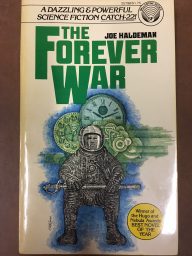THROWBACK SF THURSDAY: The Forever War by Joe Haldeman
Thursday , 19, January 2017 Book Review 7 Comments The year is 1997. Otherwise known as the “far future” for people living in 1974. William Mandella is a bright, young physics student. Or he was, before he got drafted into the United Nations Exploratory Force (emphasis on force) under the Elite Conscription Act of 1996 (because wars aren’t really an outrage until the elite get forced to do their part). Humans in 1997 haven’t just colonized the solar system. With the discovery of “collapsars” in 1985, you can now “send a shipload of colonists to Fomalhaut for less than it had once cost to put a brace of men on the moon.” That’s because you can travel between two collapsars with a travel time of exactly zero. The galaxy just got a lot smaller. Small enough for humanity to bump up against the alien Taurans (our word, there being no way to talk to them). As you can guess, first contact doesn’t go well. We are now in our first interspecies, interstellar war.
The year is 1997. Otherwise known as the “far future” for people living in 1974. William Mandella is a bright, young physics student. Or he was, before he got drafted into the United Nations Exploratory Force (emphasis on force) under the Elite Conscription Act of 1996 (because wars aren’t really an outrage until the elite get forced to do their part). Humans in 1997 haven’t just colonized the solar system. With the discovery of “collapsars” in 1985, you can now “send a shipload of colonists to Fomalhaut for less than it had once cost to put a brace of men on the moon.” That’s because you can travel between two collapsars with a travel time of exactly zero. The galaxy just got a lot smaller. Small enough for humanity to bump up against the alien Taurans (our word, there being no way to talk to them). As you can guess, first contact doesn’t go well. We are now in our first interspecies, interstellar war.
By chapter 3, Mandella is training on Charon. Between the cold (cold) and the lack of atmosphere, they won’t be fighting in their skivvies. We get treated to several chapters on power armor training. They haven’t even started fighting yet, and this is really cool stuff, mainly because Haldeman is serious about keeping his science hard. Between the cold and lack of atmosphere, if you suit fails, you die. At temperatures approaching absolute zero, it’s easy to fall down. You fall on your exhaust fins—heck, you just lean on them—you die. And people do, long before we ever see an enemy.
We’re 50 pages in before we get a look at a Tauran.
He had two arms and two legs, but his waist was so small you could encompass it with both hands. Under the tiny waist was a large horseshoe-shaped pelvic structure nearly a meter wide, from which dangled two long skinny legs with no apparent knee joint. Above that waist his body swelled out again, to a chest no smaller than the huge pelvis. His arms looked surprisingly human, except they were too long and undermuscled. There were too many fingers on his hands. Shoulderless, neckless. His head was a nightmarish growth that swelled like a goiter from his massive chest. Two eyes that looked like clusters of fish eggs, a bundle of tassels instead of a nose, and a rigidly open hole that might have been a mouth sitting low down where his adam’s apple should have been.
Like the aliens in The High Crusade, the Taurans don’t know much about fighting humans. But they will.
From there we get a damn near perfect speculative fiction tale. The science is hard and there is a lot of it. As military SF, it is heavy on a mix of Kafka-esque bureaucracy and gallows humor, paired with some really good battles. The futurology is always thought-provoking, if not particularly accurate (it never is). It’s not just a military SF novel, it’s a war novel, and the characterization as Mandella grapples with war is terrific. There is even a good love story stuck in there. And the entire thing works on a figurative level (it was certainly a reaction to both Heinlein’s Starship Troopers and to Vietnam). If this is message fiction, it’s message fiction as it should be done: smart, open to multiple interpretations, thought-provoking, subversive (to any orthodoxy), woven into the fabric of the story, and always, always entertaining.
The Forever War is most famous for the way it deals with time dilation due to the near-light speed travel needed to wage an interstellar war. By the time Mandella has finished his two required years of subjective service, twenty-seven years have passed on Earth. He gets his first shore leave in 2023. His inability to reintegrate back into society has its obvious parallel, and thematically drives much of the story, along with his sardonic wit.
The collapsar Stargate was a perfect sphere about three kilometers in radius. It was suspended forever in a state of gravitational collapse that should have meant its surface was dropping toward its center at nearly the speed of light. Relativity propped it up, at least gave it the illusion of being there . . . the way all reality becomes illusory and observer-oriented when you study general relativity. Or Buddhism. Or get drafted.
I was rather surprised, though, at how little Haldeman and Mandella have to say about time dilation. As much or more time and brainpower is spent on power armor, healthcare (including a very creepy take on limb regeneration), and near-light speed travel. A hard science fiction fan will find a lot to like, or just someone who likes me who loves it for the worldbuilding. Haldeman has just as much to say about social science, especially when Manella returns to Earth in 2023.
Haldeman is no Malthus. But he’s a bit off in his projections notwithstanding. About a third of the world population is homosexual. Which is, to be fair, “the one sure method of birth control.” But was it really so far-fetched that birth rates for heterosexual couples in the first-world would drop? (The world fertility rate has been dropping since the mid-1960s.) It’s probably interesting that, although people tend to vastly overestimate the rate of homosexuality in the general population, Haldeman based massive change in the homosexual population not on organic growth but on government policy, treating it as a mutable characteristic (in general, science fiction a few decades ago had much more confidence—and openness—to social planning via psychology). But, really, Haldeman is probably not so much trying to engage in serious futurology and building his world to complement the themes of the book, one of which is the disassociation from civil society of soldiers returning from war.
 And Haldeman doesn’t make the Malthusian mistake of projecting we won’t be able to feed everyone, but he assumes we will avoid it by squeezing most of the population into arcologies and giving over huge amounts of land to farming. To the contrary, suburban sprawl has won out over farms as yields per acre have skyrocketed. U.S. corn yields, for example, quadrupled between 1940 and 2000. Haldeman also gives far too much credit to central planning—the “impartial distribution of calories.” World poverty (and hunger with it) has plummeted for decades without impartial distribution. We managed to get through 2004 sans foods riots that burned any cities to the crowd (to my knowledge—has anyone checked on Cleveland?). Although we may have had some had we handed “over the production and distribution of food” to the UN. Do you want Soylent Green? Because that’s how you get Soylent Green.
And Haldeman doesn’t make the Malthusian mistake of projecting we won’t be able to feed everyone, but he assumes we will avoid it by squeezing most of the population into arcologies and giving over huge amounts of land to farming. To the contrary, suburban sprawl has won out over farms as yields per acre have skyrocketed. U.S. corn yields, for example, quadrupled between 1940 and 2000. Haldeman also gives far too much credit to central planning—the “impartial distribution of calories.” World poverty (and hunger with it) has plummeted for decades without impartial distribution. We managed to get through 2004 sans foods riots that burned any cities to the crowd (to my knowledge—has anyone checked on Cleveland?). Although we may have had some had we handed “over the production and distribution of food” to the UN. Do you want Soylent Green? Because that’s how you get Soylent Green.
William Mandella was drafted in 1997. He’s first discharged in 2023. By then “serious crime has been on the decline for twenty years.” We beat them by a solid decade—the US crime rate started dropping in the early 1990s. And we didn’t even need “psychometry so advanced that we can spot a potential criminal at the age of six”! (Unless pop tart guns count, but we didn’t catch that potential criminal until he was eight.)
Men in 2023 have also taken to wearing make-up. Nope. Not gonna touch that one.
For all that, The Forever War has aged very well. I read a couple other science fiction books this past month, both written in the 1950s. They feel like they were written in the 1950s. If you picked them up today, reading them would be a dissonant experience. The Forever War feels like it could have been written today, or in 1997.
 Which is not to say that it is not a 1970s book. It’s 1960s free love run wild, but not without a dollop of 1970s nihilism on top. The military of 1997 is not only gender integrated (binary gender integrated, that is, tsk tsk), but sex between bunkmates is not only accepted but expected by law and by custom. So love started out free and wound up subsidized. The problem with Haldeman’s futurology is that he forgets that all countercultural movements provoke a conservative reaction (or several). (I’m again treating everything straight-up and not considering that in all likelihood Haldeman was pushing every button he could reach.) The truth wound up a bit more prosaic. I had some buddies in the military in 1997. I understand there wasn’t much sex. Opening combat roles to US women cut against an ongoing trend against libertinism. Or at least toward more privacy. Modern man doesn’t even like same-sex group showers, let alone the co-ed showers of Starship Troopers. Heaven forbid co-ed bunk assignments.
Which is not to say that it is not a 1970s book. It’s 1960s free love run wild, but not without a dollop of 1970s nihilism on top. The military of 1997 is not only gender integrated (binary gender integrated, that is, tsk tsk), but sex between bunkmates is not only accepted but expected by law and by custom. So love started out free and wound up subsidized. The problem with Haldeman’s futurology is that he forgets that all countercultural movements provoke a conservative reaction (or several). (I’m again treating everything straight-up and not considering that in all likelihood Haldeman was pushing every button he could reach.) The truth wound up a bit more prosaic. I had some buddies in the military in 1997. I understand there wasn’t much sex. Opening combat roles to US women cut against an ongoing trend against libertinism. Or at least toward more privacy. Modern man doesn’t even like same-sex group showers, let alone the co-ed showers of Starship Troopers. Heaven forbid co-ed bunk assignments.
On the plus-side, there’s universal healthcare! You see, “[i]t’s part of the Universal Medical Security System. Everybody gets a rating on their seventieth birthday. It comes in automatically from Geneva.” What sort of rating? On what basis? “Well, it tells how important a person is and what level of treatment he’s allowed. Class three is the same as anybody else’s; class two is the same except for certain life-extending—”
“And class zero is no treatment at all.”
But don’t call it a death panel! One, there isn’t really any panel. More of a sort of amorphous, bureaucratic Borg. Plus, they aren’t killing anyone! They just won’t stop you from dying. Or let you pay someone else to do any stopping. But let’s keep our priorities straight. Healthcare is universal. It’s not like the bad old days.
Mandella, being the lusty, 1997 sort (Gen X! Gen X! Gen X!) thinks all this is a bunch of well cushioned fascism. Back in 1997 you could throw a Metallica cassette into your Walkman (or a CD into your Discman, if you were some kind of rich jackhole) and really be an individual, you know? Where can you be an individual in 2023? The moon.
“[A] letter from Luna to Earth cost $100 postage—plus $5,000 tax. It discouraged communication with what the UN considered to be a bunch of regrettably necessary anarchists.” A phone call will cost you a $25,000 bond, but if you keep your conversation short you’ll get some of that back. Of course the reason there are so many “anarchists” up there is that the politicians of Haldeman’s world, like our political forefathers, like to send off colonists to keep them from “stirring up trouble at home.” Anyway, Mandella gets a phone call into his brother up there, and his brother convinces him to sign back up for the U.N. Exploratory Force—they’ve offered him his choice of assignments, so he chooses the moon. And he gets it—for just long enough to arrive on the moon and receive his new orders—back to fighting Taurans and time dilation.
The battle scenes are very good, although there aren’t a whole lot of them. (There isn’t a whole lot of anything. The Forever War is 218 pages long. If it was written today it would be 812 pages long and there would be a lot of everything.) And Haldeman takes the fog of war seriously. Why fight planet-side when you can fight in ships? Ships necessarily controlled by AI, with you maybe being sealed in an acceleration shell during the fight, only to find out what happened on being reawakened, or not. The ground fights tend to be awkward affairs. Because of the time dilation, neither side has any way of knowing whether the other is several decades ahead of them in tech. It makes for a high casualty rate.
Mandella does have a way with words, and a soldier’s gallows humor. On one planet he encounters what, “in a fit of originality,” has been named the shark but “could eat a stack of earth sharks for breakfast.”
He was twelve meters of flexible muscle with a razor-sharp tail at one end and a collection of arm-length fangs at the other. His eyes, big yellow globes, were set on stalks more than a meter out from his head. His mouth was so wide that, open, a man could comfortably stand in it. Make an impressive photo for his heirs.
 Nothing Haldeman presents, whether in 2023 or later, is a full-out dystopia. No Hunger Games or Big Brother. But it’s still fascist, if well-cushioned. Even if Mandella could escape the Kafka-esque bureaucracy of UNEF, he would just be trading it in for an even bigger, more Kafka-esque bureaucracy. Lack of sexual freedom is a significant theme, and one Haldeman keeps ratcheting up. Eventually, someone describes it to Mandella thusly, “A, people showed a regrettable lack of sense in choosing their genetic partner. And B, the [Eugenics] Council saw that racial differences had an unnecessarily divisive effect on humanity; with total control over births, they could make everybody the same race in a few generations.” Not that I’m against hot interracial loving, but I prefer it be entirely consensual (really I’m just for it to between me and my wife, I don’t care what the rest of you jackholes do). Worse—well, not worse, but totally not cool—this cuts out the hot and the loving. There is a lot of sex, but not much choice. In the military? Then you’d better sleep with your assigned bunkmate. In the future? Then you’d better sleep with someone of the same sex. No one goes hungry, but no one goes full either. You have free healthcare, until you don’t have any at all. You can live in any number of gigantic beehives that probably all look a lot alike on the inside. The sort of place a certain sort of person may think of as ideal in the abstract, for other people. Or an even weirder person might actually like to live in. But it ain’t for me.
Nothing Haldeman presents, whether in 2023 or later, is a full-out dystopia. No Hunger Games or Big Brother. But it’s still fascist, if well-cushioned. Even if Mandella could escape the Kafka-esque bureaucracy of UNEF, he would just be trading it in for an even bigger, more Kafka-esque bureaucracy. Lack of sexual freedom is a significant theme, and one Haldeman keeps ratcheting up. Eventually, someone describes it to Mandella thusly, “A, people showed a regrettable lack of sense in choosing their genetic partner. And B, the [Eugenics] Council saw that racial differences had an unnecessarily divisive effect on humanity; with total control over births, they could make everybody the same race in a few generations.” Not that I’m against hot interracial loving, but I prefer it be entirely consensual (really I’m just for it to between me and my wife, I don’t care what the rest of you jackholes do). Worse—well, not worse, but totally not cool—this cuts out the hot and the loving. There is a lot of sex, but not much choice. In the military? Then you’d better sleep with your assigned bunkmate. In the future? Then you’d better sleep with someone of the same sex. No one goes hungry, but no one goes full either. You have free healthcare, until you don’t have any at all. You can live in any number of gigantic beehives that probably all look a lot alike on the inside. The sort of place a certain sort of person may think of as ideal in the abstract, for other people. Or an even weirder person might actually like to live in. But it ain’t for me.
SPOILERS
We only find out what started the war at the very end. It wasn’t the Taurans. And we didn’t even really have a good reason. The narrative at least suggests that old soldiers looking to “dust[ ] off their medals” were to blame. It’s a slur on old soldiers, and one that encourages facile thinking about war. Easier to assume mendacity than face the uncomfortable truth that good people can make decisions in good faith for the right reasons…and still screw it up and get people killed. And it does address that first contact is hard, as anyone who has read a book on Captain Cook could tell you. It’s hard enough between humans, let alone between humans and aliens.
END SPOILERS
It is very much a war novel. Probably a little more All Quiet on the Western Front than Fields of Fire. Not much like Slaughterhouse Five. But then nothing is like Slaughterhouse Five. I’m probably not the person to opine on the relative merits of war novels. The more usual comparison is Catch-22, but I, to my shame, haven’t read it. There are a lot of themes in there specific or highly relevant to war and the military, but the single biggest theme of the book is the disassociation from civil society felt by a soldier returning home (Haldeman served in Vietnam). Haldeman just turns everything up to 11 to help get we civilians in the right frame of mind.
For all that, Mandella remains a traditional sort. That, perhaps, is his great triumph. He’s exposed to the horrors of war, and Haldeman heaps on the figurative burdens. But he walks away neither pacifist nor warmonger. Neither homosexual nor libertine, a one-woman man across all space and time and probability.
(Note: This is a review of, as best I can tell, the original version of the novel. It is not the Author’s Preferred Version, not released until 1997.)
H.P. is an academic, attorney, and “author” (well, blogger) who will read and write about anything interesting he finds in the used bookstore wherever he happens to be for the moment. He can be found on Twitter @tuesdayreviews and at Every Day Should Be Tuesday.
I liked FOREVER WAR a lot. (FOREVER PEACE, on the other hand, not so much.)
John Steakley’s ARMOR is another good book in a similar vein.
Armor sounds very intriguing. I also have my eye on Bill, the Galactic Hero. But I think Starship Troopers needs to be the next military SF I read.
I’ve often suggested that Starship Troopers and Forever War be read together, just for the conversation of contrasts.
*The Forever War* is still one of my favorite books. The only other book to surpass that one as my personal, all-time favorite is *The Stars, My Destination*. It’d be awesome to see your analysis of that, if you got the chance.
I will put it on the list. My next post is going to be on Bester’s The Demolished Man, which I loved.